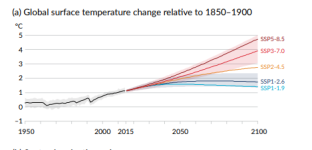- Joined
- Jan 25, 2012
- Messages
- 44,616
- Reaction score
- 14,470
- Location
- Texas
- Gender
- Male
- Political Leaning
- Conservative
We often hear that a grown tree only picks up about 50 lbs of carbon per year,
but if you consider biomass, it almost has to be more than that.
When a 6 lb gallon of gasoline is burned it produces nearly 20 lbs of CO2,
but the reverse is also true, to create a pound of biomass, requires about 3 pounds of CO2.
A low end hay field can produce about 4000 lbs of dry hay per planting, or represent a CO2 uptake of 12,000 lbs of CO2 per acre.
I think an acre of pine trees at 435 trees per acre, will create about 24,000 lbs of dry mass, or pick up about 72,000 lbs of CO2 per year.
I wonder how bamboo compares?
Bamboo is very fast growing
I wonder if we could find a way to frame houses with bamboo instead of pine?
Wood in a framed building is effectively sequestered carbon.
but if you consider biomass, it almost has to be more than that.
When a 6 lb gallon of gasoline is burned it produces nearly 20 lbs of CO2,
but the reverse is also true, to create a pound of biomass, requires about 3 pounds of CO2.
A low end hay field can produce about 4000 lbs of dry hay per planting, or represent a CO2 uptake of 12,000 lbs of CO2 per acre.
I think an acre of pine trees at 435 trees per acre, will create about 24,000 lbs of dry mass, or pick up about 72,000 lbs of CO2 per year.
I wonder how bamboo compares?
Bamboo is very fast growing
I wonder if we could find a way to frame houses with bamboo instead of pine?
Wood in a framed building is effectively sequestered carbon.

